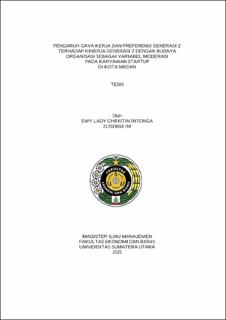Pengaruh Gaya Kerja dan Preferensi Generasi Z terhadap Kinerja Generasi Z dengan Budaya Organisasi sebagai Variabel Moderasi pada Karyawan Startup di Kota Medan
The Influence of Work Style and Generation Z Preferences on Generation Z Performance with Organizational Culture as a Moderating Variable among Startup Employees in Medan City

Date
2025Author
Ritonga, Ewy Lady Christin
Advisor(s)
Siahaan, Elisabet
Gultom, Parapat
Metadata
Show full item recordAbstract
The rapid growth of startups in Medan City has opened up significant opportunities for Generation Z to actively participate in the workforce. However, many startups still struggle to optimize Generation Z’s performance due to a limited understanding of their work styles and preferences. This study aims to analyze the influence of Generation Z’s work style and preferences on their performance, with organizational culture as a moderating variable, among startup employees in Medan City. This research employs a quantitative approach using Partial Least Squares Structural Equation Modeling (PLS-SEM) for data analysis, with a total sample of 160 Generation Z respondents working in various startups in Medan. The results reveal that work style has a positive and significant effect on Generation Z’s performance, indicating that the more flexible, collaborative, and technology-aligned the work style, the higher the performance of Generation Z in completing tasks. Generation Z’s preferences also have a positive and significant effect on performance, suggesting that fulfilling their preferences—such as work-life balance, use of technology, learning opportunities, and values with social impact—can enhance their engagement and productivity in startups. The moderation analysis shows that organizational culture negatively moderates the effect of work style on performance, implying that a rigid and procedural organizational culture can reduce the positive impact of work style on Generation Z’s performance. Conversely, organizational culture positively moderates the influence of Generation Z’s preferences on their performance, indicating that an organizational culture that supports flexibility, collaboration, and innovation strengthens the effect of Generation Z’s work preferences in driving their performance in startups. This study contributes theoretically by supporting the Person-Environment Fit theory and Self-Determination Theory, and provides practical contributions for startup management in formulating work style and organizational culture policies that align with Generation Z’s characteristics, thereby enhancing productivity and ensuring the sustainability of startups in the digital competition era.
Collections
- Master Theses [1243]
